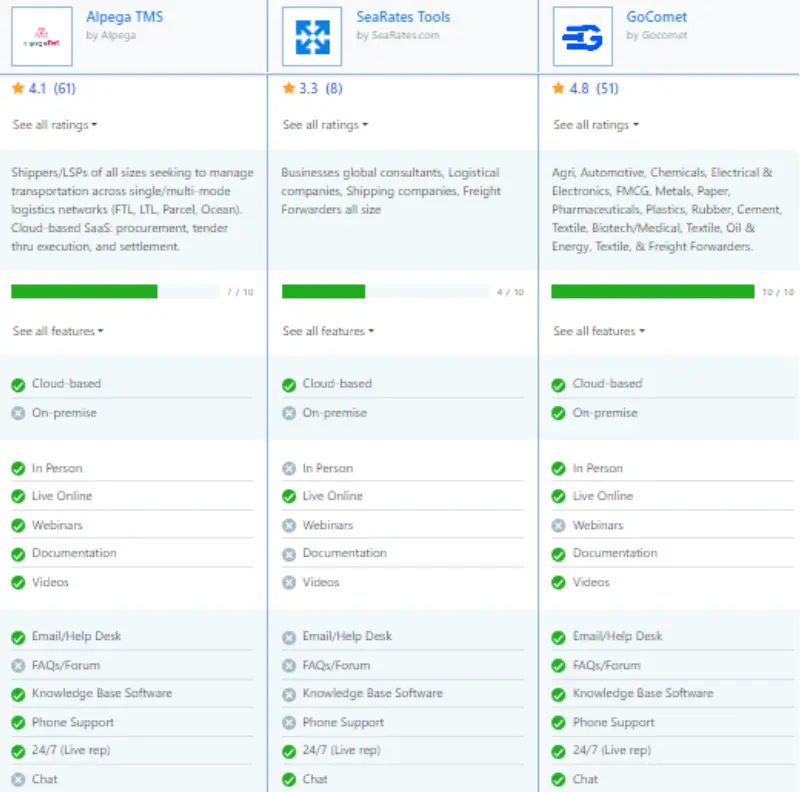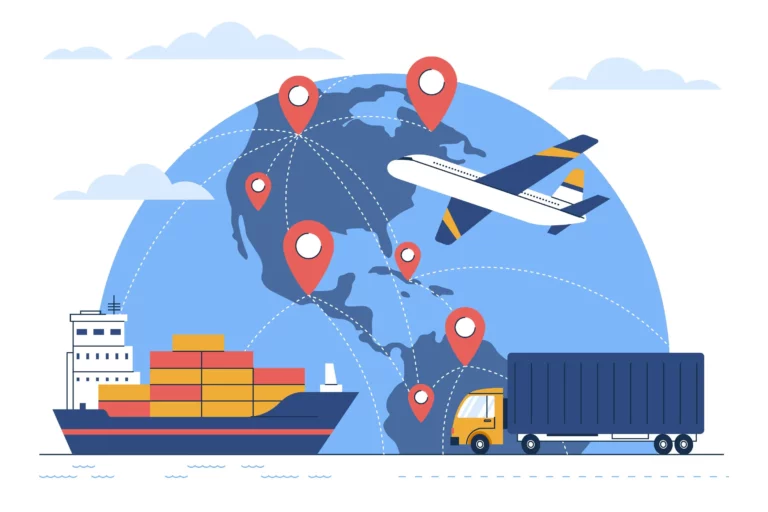Alpega Review: Competitor Comparison
Founded in 2017, Alpega has grown into a global logistics powerhouse. Their cloud-based platform leverages a network of freight exchanges and transportation management systems (TMS) to connect shippers, carriers, and logistics providers. While Alpega boasts extensive features, it’s crucial to evaluate them objectively to ensure they align with your unique requirements.
Alpega’s offerings encompass several key solutions:
- Alpega TMS: A cloud-based transportation management system designed to optimize transportation planning, execution, and settlement processes.
- Alpega Freight Exchanges: A network of online marketplaces connecting shippers with carriers for efficient freight procurement and capacity management.
- Teleroute: A leading European freight exchange platform facilitating real-time spot market transactions for full truckload (FTL) and less-than-truckload (LTL) shipments.
- Wtransnet: A prominent freight exchange platform in Spain and Portugal, specializing in FTL and LTL spot market transactions.
- TenderEasy: A cloud-based tender management solution streamlining the freight tendering process for shippers and carriers.
- Transwide: A Belgium-based freight exchange platform focused on FTL and LTL spot market transactions in Western Europe.
Alpega Through Customer Reviews
While Alpega offers a vast array of features, it’s important to consider user experiences. Here’s a breakdown of some key points gleaned from platforms like Capterra and G2 Crowd.

Alpega vs competitors: product features comparison
| Feature | Searates | GoComet | Alpega |
| Container tracking | |||
| Freight index for benchmarking real-time freight rates | |||
| Vessel scheduler | |||
| Logistic document manager | |||
| Predictive ETA using multiple sources (Carrier, AIS and live vessel data) | |||
| Advanced insights into carrier performance | |||
| Automated shipment tracking from the shipper till the end consignee | |||
| Accurate AI-driven port intel | |||
| Proactive BL upload and auto-tracking | |||
| Smart tracking to track non-traceable shipments | |||
| Single platform from booking to invoice reconciliation |
Alpega’s Potential Advantages
- Extensive Network: Alpega boasts a vast network of freight exchanges and carriers, providing shippers with access to a wide range of transportation options. This can be particularly beneficial for businesses with complex supply chains or those operating in international markets.
- Modular Solutions: Alpega’s modular approach allows businesses to choose the specific functionalities they need, from freight exchange access to a comprehensive TMS. This can be cost-effective for companies with simpler logistics requirements.
- Global Reach: Alpega’s presence in various regions, particularly Europe, can be advantageous for businesses operating in those markets. They offer regional expertise and potentially streamlined compliance processes.
Potential Considerations for Alpega
While Alpega boasts a vast array of features and a global network, there are some key considerations for businesses evaluating their platform:
- Complexity for Smaller Businesses: The sheer volume of features and functionalities offered by Alpega can be overwhelming for smaller businesses with less complex logistics needs. Imagine a small bakery owner trying to navigate a platform designed for managing the global supply chains of a multinational corporation. A user-friendly interface with tiered subscription plans offering a range of functionalities would be more suitable for such businesses.
- Potential Integration Challenges: Some users reported encountering integration issues when connecting Alpega’s platform with existing enterprise software solutions. A seamless flow of data between your logistics management platform and other business-critical systems like ERP or warehouse management software (WMS) is crucial for operational efficiency.
- Limited Customization Options: While Alpega offers modular solutions, user reviews suggest limitations in customizing workflows to cater to highly specific business processes. Every business has unique workflows and processes.
- Limited Reporting and Analytics Capabilities: While Alpega likely offers some level of reporting functionality, in-depth analytics are crucial for businesses seeking to optimize their supply chains. A robust logistics management platform should provide comprehensive reporting and analytics tools. These tools should enable users to drill down into key metrics, identify areas for improvement, and make data-driven decisions to optimize transportation costs, delivery times, and overall supply chain efficiency.
Recommendations for a Streamlined Logistics Management Solution
Having explored Alpega’s offerings and potential areas for improvement, let’s delve into key features a comprehensive logistics management platform should possess:
- Proactive Services for Logistics Platforms: Logistics platforms should prioritize proactive customer support with dedicated success managers. Platforms should also go beyond basic tracking to offer real-time disruption alerts, proactive billing, and advanced cost analysis for better decision-making. Integrating with carriers for real-time ETAs, congestion alerts, and predictive notifications improves shipment transparency and proactive management.
- Prioritize User-Friendliness for All Business Sizes: Offering tiered subscription plans with varying functionalities allows businesses to choose a solution that aligns with their specific needs and avoids overwhelming users with features they don’t require. In addition to this, contextual help features, such as pop-up tutorials or in-app guides, empower users to navigate unfamiliar functionalities independently and troubleshoot minor issues without requiring extensive support.
- Ensure Seamless Integrations for a Unified Ecosystem: The platform should offer robust and well-documented API integrations with a wide range of popular ERP systems and other business software solutions. This ensures a seamless flow of data between systems, eliminating the need for manual data entry and reducing the risk of errors.
- Empower Customization for Adaptable Workflows: The platform should allow businesses to configure workflows at a granular level within each module. This could include customizing data fields, defining approval processes, and automating specific tasks based on pre-defined triggers. This allows businesses with complex logistics requirements to leverage the platform’s core functionalities while building custom features that perfectly align with their unique workflows.
GoComet prioritizes user-friendliness and offers tiered plans to fit your needs. GoComet automates your supply chain, tackling complexity for smoother operations. Try the free demo or 15-day trial to unleash your potential!






